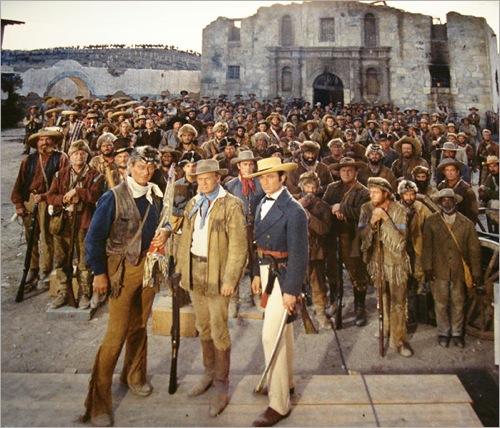
By Jason Apuzzo. Those of you who remember the old version of Libertas remember how important classic movies are to us here. This week we introduced a new series to LFM called ‘Classic Cinema Obsession‘; but we’ll also be keeping you up-to-date on classic movie news each week.
• There’s a 50th anniversary benefit screening of The Alamo this week at John Wayne’s birthplace, with Wayne’s daughter Aissa in attendance. The benefit event, a fundraiser for the John Wayne Birthplace Museum and Learning Center, takes place over 2 days – May 28th and 29th. Wayne directed The Alamo himself (with spot 2nd unit direction from John Ford) – a huge, sprawling and satisfying epic, featuring an extraordinary musical score by Dmitri Tiomkin – and The Duke considered it his most important film. Wayne considered the film a parable of America’s place in the world as the lone outpost of freedom. The Alamo famously went up against Kirk Douglas’ left-leaning Spartacus at the 1960 Academy Awards … with both films ultimately losing to Billy Wilder’s The Apartment. If you’re anywhere near Wayne’s birthplace of Winterset, Iowa, you should certainly catch this wonderful-looking event – and feel free to purchase your own copy of The Alamo in the LFM Store below.
• In related news, The Criterion Collection has just put out a new, restored version of the John Wayne/John Ford Classic Stagecoach on DVD and Blu-Ray. You can buy this version in the LFM store above.
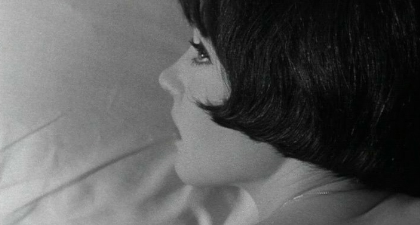
• I’m obsessed with Godard and his films, so I was thrilled this past week to learn that one of the few Godard classics I haven’t seen, Vivre Sa Vie, also just received the Criterion DVD/Blu-Ray treatment. You can read a review of this new disk here. As a side note, Richard Brody’s marvelous biography of Godard, Everything is Cinema, has just been released in paperback. It’s the definitive biography of one of Europe’s most visionary and mercurial filmmakers of the past 40 years, so check out both Vivre sa Vie and Everything is Cinema in our store above.
• I recently had the pleasure of reading Michael Sragow’s wonderful biography, Victor Fleming: An American Movie Master. If there is a forgotten man in the history of cinema, it’s clearly Fleming. All Fleming did was direct Gone With the Wind and The Wizard of Oz (in the same year, Hollywood’s Annus mirabilis of 1939), while shaping the careers of such stars as Clark Gable, Ingrid Bergman, Gary Cooper, Jean Harlow, Spencer Tracy, Clara Bow, Douglas Fairbanks – in countless box-office smashes like Red Dust, Captains Courageous, Bombshell, The Virginian, The Rough Riders … where does one begin?
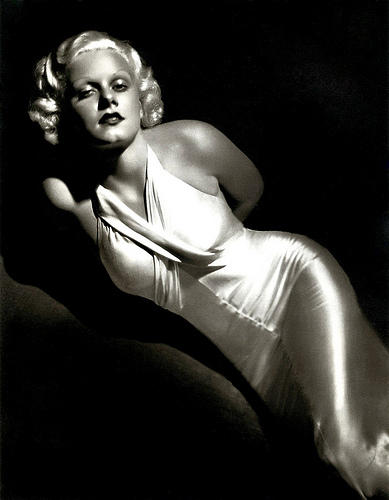
Sragow’s meticulously researched book challenged my assumption that John Ford, Frank Capra and Howard Hawks were the undisputed masters of mid-century American movies. I now have the sense that Fleming may have been the greatest of them all. Fleming was absolutely instrumental in developing the ‘man’s-man,’ Hemingway-esque persona of such stars as Fairbanks, Gable and Cooper – yet he was a gifted director of women as well … something aided by the fact that he was also one of Hollywood’s reigning lotharios (i.e., he knew his subject).
I will likely do a full review of Sragow’s biography down the line, but let me simply remind everyone out there who’s so impressed with Avatar‘s box office total that Fleming’s Gone With the Wind in 2010 dollars would have grossed $1.6 billion domestically. And this was by no means unusual for Fleming’s career; Fleming produced box-office smash after box-office smash – big, emotional, humanistic films that were popular around the world to a degree unrivaled except when speaking of Walt Disney’s films. Disney, Cecil DeMille and possibly Steven Spielberg are Fleming’s only rivals in terms of producing huge popular hits over a long period of time. [Funny footnote: Fleming urged Louis Mayer to sign the unknown Disney when Disney was shopping his “Steamboat Willy”/Mickey Mouse series around Hollywood; Mayer refused, thinking American housewives would never enjoy watching a rodent on screen.]
How compelling and emotional and universal was the appeal of Fleming’s filmmaking? It’s said that Stalin himself wept when he saw Fleming’s The Great Waltz, and refused to give-out medals to Soviet directors until they could match Fleming’s style. [Oh … and did I mention that Fleming was an ardent anti-communist?]
Fleming’s power in Hollywood after the twin smashes of Gone With the Wind and The Wizard of Oz was unparalleled. He’d actually worked for decades with no contract, never wanting to tie himself down. When MGM begged him to sign a multi-year deal, he did ultimately sign – with the stipulation that there be no producer credit on his films … which would simply be known as ‘Victor Fleming Productions’. When reading about Ford, Capra or Hawks, one gets the impression that those great masters were constantly battling their studio bosses; such battles are strikingly absent from Fleming’s career. A huge, strapping man who hunted big game, sailed and flew planes in his spare time – and was a former race car driver and mechanic – nobody thought to argue with Vic Fleming about anything. [Clark Gable’s rough-and-tumble character ‘Vic’ in Mogambo was based largely on Fleming – Mogambo itself being a remake of the Fleming/Gable Red Dust. John Wayne is also said to have partially based his Hondo persona around Fleming.]
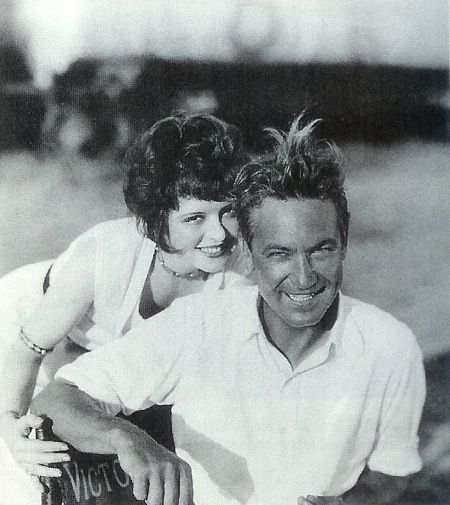
Fleming has sometimes been mistaken as a typical studio-system director who simply did what the studio bosses told him – a non-auteur, who merely piggy-backed off other peoples’ material. Nothing could be further from the truth. Fleming was the rare director who was so successful and respected as to operate largely above the studio system – nobody told Vic Fleming what to do. He simply produced so many hits that nobody could boss him around. His great talent was in unleashing broad, human emotions in his films – usually based on some form of unfulfilled longing. Fleming was a romantic, in the old-fashioned sense – and a true master.
In some alternate universe, there’s nothing I would have liked to do more than go motorcycle riding with Fleming, Gable and Ward Bond out to Palm Springs while talking women and anti-communism. Hollywood used to be cool like that.
You can buy a copy of Victor Fleming: An American Movie Master in our store above.
• In other news, Turner Classic Movies has a review out of the extraordinary (if rarely seen in the West) Iranian film from 2000, The Day I Became a Woman. You can buy the film in the LFM store above.
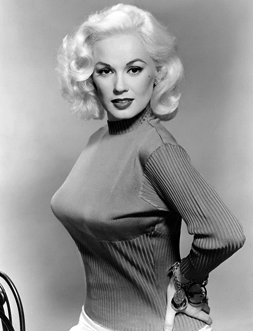
• There are a lot of great classic movie bloggers out there these days, and one of my favorites is Kimberly Lindbergs – who blogs for both Movie Morlocks (the official TCM blog) and her own site, Cinebeats. Kimberly has a great little review up of something that looks like a lot of fun, if you love classic sci-fi: The Navy vs. The Night Monsters. Perhaps we’re using the term ‘classic’ loosely here … but it’s hard to resist a film that pits Mamie van Doren against alien trees (?) in the Antarctic. I recently caught the neglected Mamie van Doren classic College Confidential (1960) and was quite impressed by her … vivacious screen persona. Ahem.
In any case, click over to the review for more details on how Mamie deals with the unusual challenge of killer trees …
The Navy vs. The Night Monsters will be released for the first time on DVD June 29, 2010, and you can pre-order it right here at the LFM Store above! We miss nothing here …